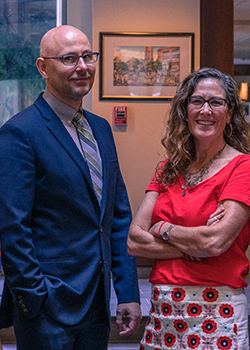In 2014, the Maryland General Assembly passed legislation permitting the use of cannabis for certain medical conditions and the creation of a medical cannabis industry, from growers to distributors. The state’s medical cannabis system, which allows patients with qualifying conditions certified by an authorized health care provider to acquire cannabis from licensed dispensaries, opened for business in December 2017. Medical cannabis in Maryland has generated a whirlwind of legal, public health, and social justice issues, not the least of which is the fact that cannabis (marijuana) is still defined by the federal government as a “Schedule I drug,” “with no currently accepted medical use and a high potential for abuse” under the Controlled Substances Act, making it illegal under federal law to use, even for medicinal purposes. The University of Maryland Francis King Carey School of Law and the Network for Public Health Law have been at the forefront of addressing these complicated challenges to ensure a safe, efficient, and equitable medical cannabis system.
The Public Health Law Clinic, directed by Professor Kathleen Hoke (pictured right), has been involved in Maryland’s medical cannabis program since its inception. The clinic has played a key role in educating Maryland’s public health community by tracking and reporting on cannabis legislation every session. In addition, under Professor Hoke’s guidance, clinic students have advocated for key cannabis legislation in Annapolis. This past session, clinic student John Travers '19 testified in support of legislation that would have authorized institutions of higher education and related medical facilities, like the University of Maryland, Baltimore (UMB), to conduct research related to medical cannabis. Clinic student Kevin Redden ’20 testified in support of a Senate bill that would have prohibited the revocation of parole based on use or possession of cannabis for qualified patients and licensed individuals in the cannabis industry. Redden testified that punishing parolees who are certified patients or licensees within the state-created medical cannabis industry subverts the goals of the medical cannabis program and is detrimental to public health. The provisions in these bills were absorbed into a larger medical cannabis bill, Maryland House Bill 17/Senate Bill 857, which passed in the State Senate and the House of Representatives. Governor Larry Hogan signed the legislation in April and it went into effect on July 1.
In addition to her work with the Public Health Law Clinic, Professor Hoke is the executive director of the Network for Public Health Law’s Eastern Region. The Network for Public Health Law is a national organization funded by the Robert Wood Johnson Foundation. The network’s Eastern Region is housed in the law school. The network provides legal assistance on a broad spectrum of public health issues, including the regulation of cannabis. Eastern Region Associate Director Mathew Swinburne '08 (pictured left) is the network’s expert on the legal and public health issues associated with cannabis. He regularly meets with health departments, health care providers, hospitals, business and professional associations, law enforcement, and government officials to provide guidance on a myriad of legal challenges. The broad spectrum of concerns he hears about include illegal youth access, employment drug testing, medical cannabis use in public housing, product safety, and over-the-counter sales of CBD products.
Given the outpouring of interest in legal issues raised by the state’s medical cannabis program, the law school, the Network, and the Maryland Commission on Civil Rights co-sponsored a conference at Maryland Carey Law this past May. The conference focused on the evolving legal landscape for medical cannabis at the federal and state level, the science of medical cannabis, and issues of employment and housing law that impact employees and tenants who use medical marijuana. As a result of this conference and the network’s recognized expertise, Hoke and Swinburne were invited to be part of the Maryland Medical Cannabis Commission’s workgroup that is developing regulations for Maryland’s newly legalized edible cannabis products (e.g. cannabis infused cookies and candies). Edible cannabis products create unique public health challenges including their attractiveness to children, food safety concerns, and potential dosing problems. The Maryland Medical Cannabis Commission also posted draft regulations on edibles, which are available here.
Regulation of cannabis continues to advance in Maryland at a blistering pace. Several bills were introduced this past session to legalize recreational cannabis in Maryland, all of which died in committee. However, the General Assembly created a bipartisan workgroup of senators and delegates to study the implications of a recreational cannabis system and to make recommendations for potential legislation in 2020. Again, the legislature reached out for the network's expertise. Swinburne conducted multiple presentations for the work group on federal regulation of cannabis and the variety of state approaches to regulating recreational cannabis use.
As the cannabis industry continues to grow and the laws regulating it evolve, the University of Maryland Francis King Carey School of Law and the Network for Public Health law will continue to be a critical resource at the vanguard of this field.

